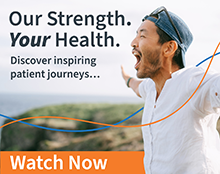
Prevention & Early Detection
Contact Us
Call 650-988-8338 |
Monday – Friday, 8 a.m. – 5 p.m.
New patient appointments available within 48 hours.
The best way to deal with cancer is to know your risks. El Camino Health's cancer program experts talk to you in depth about your lifestyle and family history. If we determine that you’re at high risk of getting a certain type of cancer, we can take action to help you lower your risk and screen you for early signs of cancer.
We have successes in treating cancer at every stage, but cancers are more curable when detected and treated early.
Cancer Risk Assessment
Knowing your risk for cancer is the first step toward prevention or early detection. We offer free, online cancer risk assessments. It takes just five to 10 minutes to complete each one and focuses on cancer risk factors that you can manage, such as getting regular screenings, eating right and exercising.
Once you’ve answered all the questions, you receive a report with important indicators about your cancer risk that you can discuss with your primary care doctor. We encourage you to review this report with your doctor and discuss appropriate steps to reduce your risk or maintain good health.
Early Detection Efforts
Our efforts to detect cancer early continue to expand. Currently, they include:
- Clinical research focusing on early detection and diagnostics, and doctors who remain current with the latest advances in gene therapy. We recently published a study — Community Low-Dose CT Lung Cancer Screening — that supports current recommendations to use low-dose CT screening for lung cancer detection in carefully defined circumstances.
- A breast risk assessment will be performed along with your screening mammogram. Our Women's Imaging Center helps identify, track and protect women at risk for breast cancer.
Cancer Screening Tests
Some of our most important early detection screening services and technologies include:
- Mammogram. Our Women's Imaging Center offers low-dose X-rays with digital mammography to produce detailed electronic images of the breasts and detect early and highly curable breast cancers too small to be felt.
- Colorectal cancer screening. Depending on your age and family medical history, our doctors recommend colonoscopy for early detection of precancerous growths or colorectal cancer.
- Lung cancer screening. If your family history or workplace puts you at higher risk for lung cancer, your doctor may suggest a routine screening of your lungs to ensure you don’t have cancer.
- Prostate cancer screening. Starting at age 45-50 (depending on your risk factors), we recommend an annual blood test and physical exam to screen for prostate cancer.
- MRI, PET and CT scans. If you’re at high risk of developing cancer, we can incorporate any of these imaging technologies into a screening program to help us identify tumors early.
- Blood tests. Our laboratory evaluates blood tests quickly and accurately to confirm or rule out cancer.
Genetic Counseling and Testing
If you have a family history of cancer, genetic consultation and testing can help you determine your cancer risk and allow you to take steps to lower it.
El Camino Health’s cancer program offers you access to genetic tests that can diagnose an existing hereditary condition or evaluate your risk factors for developing certain types of cancer, such as breast and ovarian cancers. Armed with information about your genetics, your doctor can monitor you more closely and help you determine which preventive actions can help lower your cancer risk.
Still other tests can actually predict how you’ll respond to a specific medication. Information we glean from your genetic testing allows us to tailor treatment to what your body needs.
Community Education
As part of our commitment to the health of our community, we have doctors, physician assistants and nurse practitioners who speak to community groups, companies and other organizations about health topics. These free community education programs are part of our promise to help prevent cancer.
Another important part of our outreach is our free services available through the Health Library & Resource Center at our Mountain View and Los Gatos campuses. Our health librarians can provide research assistance and help you navigate complex — and sometimes contradictory — health information to find the most appropriate information for your situation. The center offers books, videotapes classes and Internet access to help you search for information about cancer and treatment breakthroughs.
The Prevention and Early Detection Program is supported by donations to El Camino Health Foundation.
Contact a Program Specialist
To make an appointment, get information, schedule a consultation or refer someone, call 650-988-8338.
Cancer Center Reports




